Simple Steps to Stop Squeaky Bike Brakes
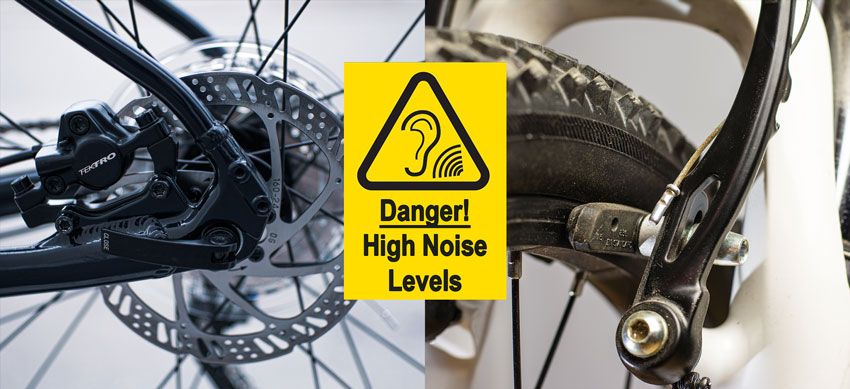
Squeaky bike brakes are one of the most common and irritating issues in cycling. But, as frustrating as the noise is, the real problem is the potential loss of braking performance.
Screeching bicycle brakes are often an indicator of damage, poor alignment, or contamination in the system, decreasing braking power.
It’s normal for bike brakes to squeak from time to time, such as when riding in wet weather or in the mud. However, if the noise persists, you should try to identify and address the issue.
This article will cover the most common causes of noisy bike brakes and how to fix them so you can ride peacefully and safely.
Common Causes of Squeaky Bike Brakes
Squeaky bike brakes are caused by vibrations of the braking material (pads) against the braking surface (rim or rotor). This unwanted vibration leads to all types of screeching and squealing.
Aside from the causes noted in this article, you’ll notice bike brakes squeaking when wet. Squeaky bike brakes when riding in the rain are unavoidable and don’t necessarily indicate further issues.
This section will diagnose each of the possible issues that cause squeaky rim brakes or squeaky disc brakes, starting with the most common cause.
Why Are My Rim Brakes Squeaking?
The most common cause of squeaking rim brakes is that the pads (blocks) are not aligned correctly or are worn down.
The first alignment issue to check is that the pads are toed in so that the leading part of the pad hits the rim first. This means setting up the brake pads so that the fronts are closer to the rim than the rears.
Alternatively, the block must be fully in contact with the rim when pressed, not touching the tire or coming below the braking surface.
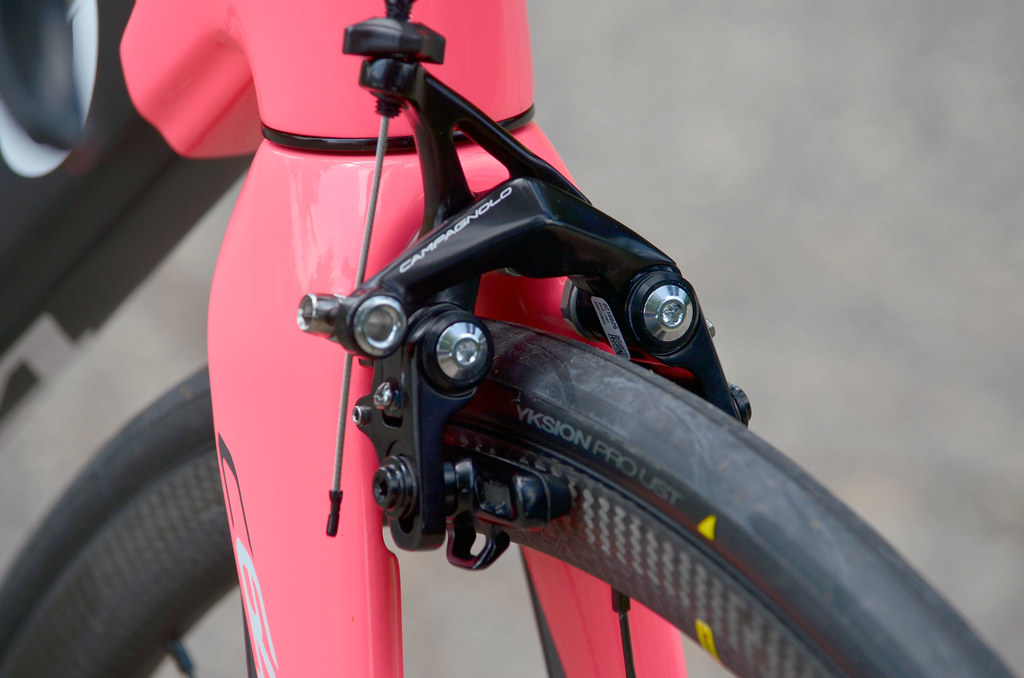
The next most common cause of screeching rim brakes is the contamination of the rim or brake pads. Oil or lube can stick to the rim or brake blocks and cause squeaking and loss of braking performance.
In addition, dirt and debris can get stuck in the brake block’s grooves, or the block’s face could glaze over from overheating.
Another possible cause is the caliper or cantilever bolt has become loose or worn down. This wearing could cause the individual arms or the whole caliper to vibrate.
Finally, the rim itself may even be worn down or deformed if you’ve been riding a bike for a long time.
Why Are My Disc Brakes Squealing?
If you have a new bike with squealing disc brakes, it likely means they weren’t bedded in correctly in the setup.
This process leaves an even deposit of some of the brake pad material onto the rotor so that they can grip properly.
The most common cause of noisy disc brakes is contamination. Dirt or oil on the rotor or brake pads will result in an aggressive screeching.
This contamination could be from general riding or cleaning the bike, so take great care when cleaning to avoid contaminating your brake pads.
All You Need to Know About Disc Brakes for Bikes
The second most likely cause of disc brake squeaking is rotor rub. This rub is usually from a misaligned brake caliper or a rotor that’s out of true.
If the noise from the rub is constant, it’s likely the caliper; if the noise is intermittent, the rotor is probably out of true.
Another issue that leads to squeaky disc brakes is if the pads overheat and glaze over. This process develops a smooth, glassy surface on the face. Alternatively, the pad material is worn, and the spring is exposed.
Finally, if the rotor bolts have loosened or the rotor itself has worn down, this could result in screeching.
How To Fix Squeaky Bike Brakes
The best way to fix noisy bike brakes is to use a process of elimination of the possible causes of the noise, starting with the most common. This section will provide step-by-step instructions to remedy the causes previously identified.
How to Stop Screeching Rim Brakes
Firstly, give your bike a thorough cleaning with warm water and dish soap, focusing on removing dirt and grease.
While cleaning the bike, remove your brake pads and clean them and the rims with a degreaser. Once clean, rinse the bicycle with water and allow it to dry in the sun or by hand.
While the brake pads are off, check the level of wear. If the three vertical grooves are almost exposed, it’s time to change them. Also, check the caliper to ensure it is tight. If not, tighten the mounting bolt.
Next, when reinstalling the pads, ensure the brake block is fully in contact with the rim surface, not touching the tire or extending below the rim. Then, tighten the bolt.
Toe in the brakes by sliding a folded business card between the pad and rim at the rear of the pad. Next, pull and hold the brake lever and loosen the brake pad bolt slightly while holding the brakes; this will reset the pad. Finally, finish the alignment process by retightening the bolt.
If your brake blocks have developed a smooth, glassy face, you may be able to restore the braking performance and stop the squeaking by using sandpaper or a file to strip away that layer.
Check the rim for wear if all else fails. For example, if the rim has a notably warped or uneven surface, it may be time to replace it.
How to Fix Noisy Disc Brakes
The most likely cause of squealing disc brakes is contamination, which may require changing to new disc brake pads.
Before buying new ones, thoroughly clean the rotor with disc brake cleaner or rubbing alcohol. Next, remove the disc brake pads and wipe away any dirt or debris adhering to the surface.
While they’re off, if you notice the material has a glassy look, you can lightly file or sand them until the glassy layer is gone.
If the brakes continue squealing after cleaning the rotor and pad, there is likely oil on the pads. If contaminated with oil, you can attempt to restore braking performance and reduce squeaking by boiling the pads or scorching them with a blow torch.
However, this rarely works, and most likely, you’ll have to replace the pads. Before installing new ones, deep clean the caliper and rotor with a degreaser to remove any trace of oil, as it could immediately recontaminate them.
If contamination isn’t the issue, you can check for brake rub and fix it with one of two steps. First, if the rotor is slightly out of true, use a trueing tool or a spanner and gradually correct it with light bends. If it is heavily warped, you will need to replace it.
Alternatively, re-align the brake caliper by loosening the mounting bolts, squeezing the brake lever, and retightening each bolt a half revolution at a time.
Bed-In Process – Avoid New Disc Brakes Squeaking
If you have a new bike, it’s essential to bed in the disc brakes to ensure full performance and avoid disc brake screeching.
To do this, find a quiet stretch of road or path. Start by riding seated at roughly 10mph. Apply the brakes evenly on both sides with two-thirds of the power, almost coming to a stop but not quite. Don’t drag the brakes while pedaling or pull them hard enough that you skid. Repeat this five times.
Then, repeat the process five times at a higher speed of roughly 15mph. As you repeat the process, you’ll notice the braking power increasing.

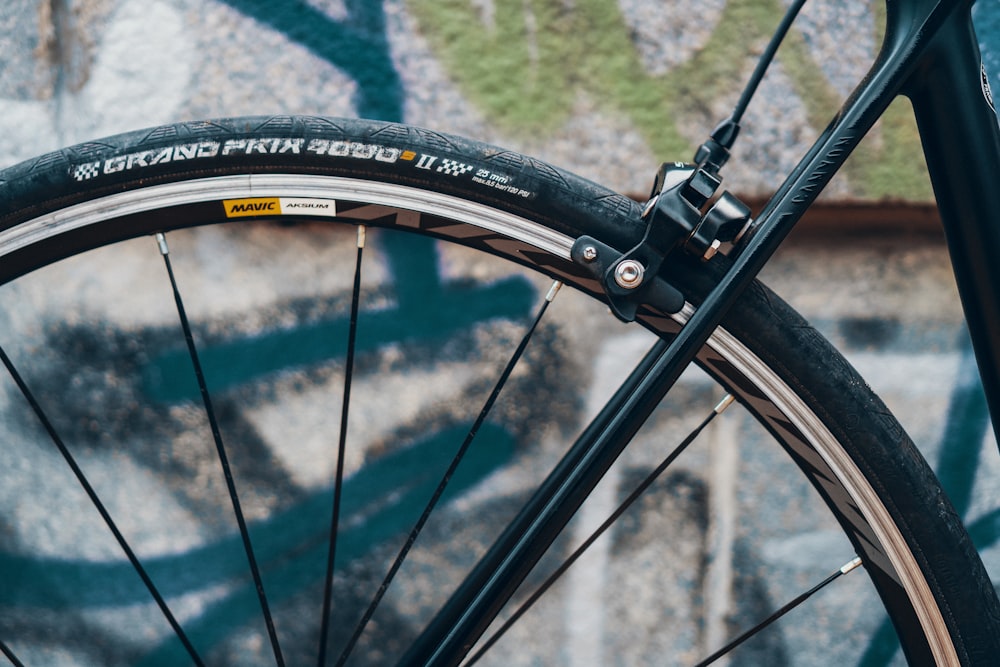
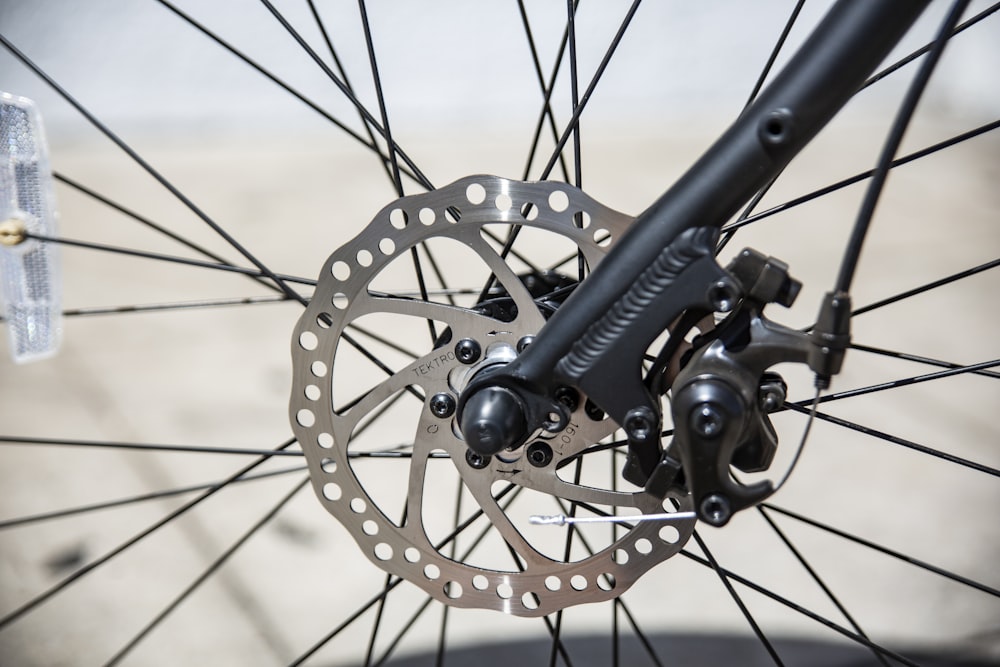
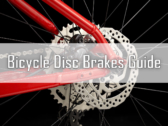




Thank you so much for this resource. As a mother of a young cyclist I really appreciate this information being available for him.
You’re welcome, Heather! We’re happy we could help!